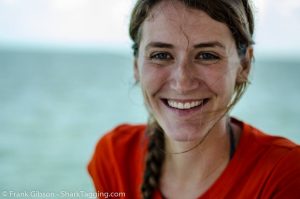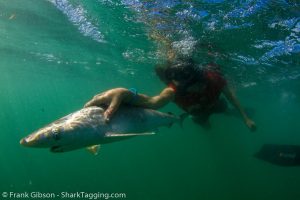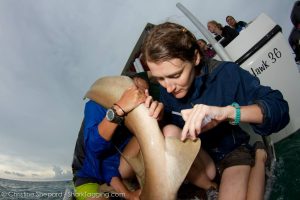Meet Our Team: Catherine Macdonald
1. What’s your role in the lab?
I’m the Intern Coordinator for RJD, which means I help hire, train, supervise and mentor our amazing team of undergraduate and master’s student interns. Although our website and Facebook page show clearly how much fun we have and how hard we work when we’re in the field tagging sharks, our interns do a lot behind the scenes, too. They offer in-classroom or skype talks to schools, help organize our sample freezers and scientific databases, update the blog and website, and even make and maintain fishing gear. They also come to our training sessions, where they learn all sorts of relevant skills (including how to handle sharks safely!) and increase their knowledge on a range of marine conservation topics. Although people often say we have cool jobs (and we agree) a lot of work that is not very glamorous goes into keeping our program running.
2. Tell us a little about yourself.
I grew up in New Jersey, but I had family in coastal South Carolina, so I spent time in the summer as a child around the ocean, and came to love the water and the creatures that lived in it. When I’m not working with RJD, I’m a PhD student at the Abess Center for Ecosystem Science and Policy where I study conflict and interactions between humans and wildlife, particularly predators. I co-teach a University of Miami course on wildlife ecology, biology and conservation, and most of my time is spent teaching, grading, mentoring students, and working on my dissertation (although I’m also in the field every chance I get). As any of our interns will tell you, I’m also lucky enough to share my life with a fantastic two-legged rescue dog named Mazi, who often makes appearances at RJD intern training sessions and really loves it when interns feed him pizza.
3. How did you get interested in marine biology and conservation?
I loved the water since I was small, and I was always obsessed with sharks. As a child, I had a computer game (back when they were on CD-ROM or floppy disk, yikes) which taught me how to identify sharks by silhouette or by the shape of their fins. I told my father I wanted to grow up to be a marine scientist or to clean fish tanks at the aquarium. While not many people in the “real world” have the job they dreamed of having when they were five, it’s not that uncommon at RJD!
4. What’s your favorite part about working in the lab?
I’ve spent the last ten years working with sharks and other marine wildlife, and I’ve loved every minute of it. Field work is incredibly rewarding, and knowing that doing your job well (and training your students well) means better science and less stress for the sharks makes me feel really good about how I spend my time. I would have said that nothing could be better than that, but over the last four years I’ve realized that the people are just as important. The amazing folks I work with are the key in determining how much fun it is to do all the day to day work that helps RJD run smoothly. I love our interns an unreasonable amount. Watching them develop skills, learn, succeed, support each other, and even (sadness!) graduate and go on to exciting new challenges makes all of our hard work completely worthwhile.
5. Is there anything you’d like to say to our blog readers?
I’d like to direct a big thanks to all of the folks out there who haven’t had a chance to have the kinds of experiences with sharks that we do and still work hard to help advance marine conservation issues. RJD relies on donors to help support our trips, particularly those for low income students, and our outreach is made much more effective by people sharing what they learn. We love working with teachers and students from around the country using our online educational tools and skype sessions. Our accomplishments have everything to do with the power of our passionate volunteers and supporters. I’d also like to add (for any of our intern or shark trip student parents who are reading this)—thank you so much for sharing your fantastic kids with us!




